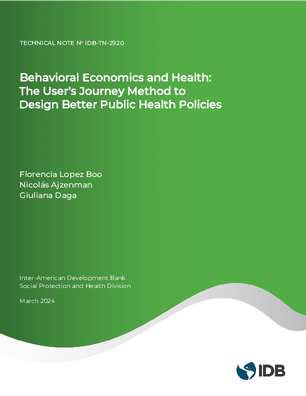Behavioral Economics and Health: The Users Journey Method to Design Better Public Health Policies
Date
Mar 2024
This brief outlines the challenges of noncommunicable diseases (NCDs) and the pivotal role of individual decision-making in healthcare. It highlights behavioral biases influencing decisions and proposes a user's journey methodology rooted in behavioral economics to identify biases at key decision points, including the decision to be screened, appointment setting, attendance, and habit formation. By showcasing examples and research conducted by the IDB and other institutions, this note demonstrates how behavioral interventions can sometimes overcome these biases and bolster health programs by, for example, increasing risk saliency, reducing hassles, and addressing cognitive limitations. In conclusion, the brief underscores the potential of behavioral economics to shape scalable and cost-effective health policies, ultimately improving health outcomes regionally and globally.
NO




